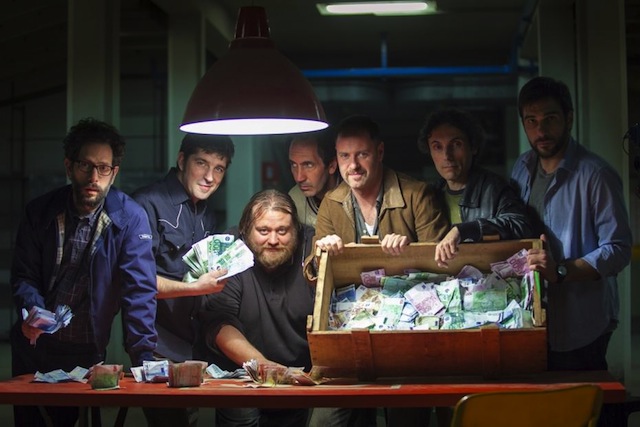For the first time in mid-October, the Miami International Film Festival hosted “MIFFecito,” a four-day-long event meant to serve as a taste of what is to come when the festival returns in March 2015.
The Miami Film Society teams up with Miami-Dade College to host the Miami International Film Festival, a week-long presentation every year in March of some of the latest work in independent and world cinema.
Previous incarnations of the festival have featured premieres of films with stars like Jesse Eisenberg, Jude Law, Marion Cotillard, and Tom Hiddleston. Over the course of MIFFecito, 10 films were presented, representing some of the most unique cinema from around the world.
The festival opened with “Behavior,” a Cuban film recently selected as the country’s nomination for the Best Foreign Language Film award at next year’s Oscars. The film told the story of a young boy struggling to get by in Havana and a teacher trying to set him straight.
Director Ernesto Daranas appeared after the film to answer questions, where he explained that “what best communicates is good storytelling, and what opens doors is universal themes of the human condition.” His storytelling absolutely shines in this film, with every character facing a challenging moral dilemma with their actions. The film also benefits from its child actors, all new to the silver screen, and all giving wonderfully natural performances. Daranas also revealed that two of the child actors, including leading man Armando Valdes Freire, had signed up for acting schools following their experience working on the film, making it all the more possible that these kids’ lives will get better.
The next day featured an Italian film called “I Can Quit Whenever I Want,” which could best be described as if “Breaking Bad” took place in Italy and was a comedy, telling the story of a group of college professors who, after losing their jobs, become rich by creating a new drug and selling it on the open market.
The film starred a brilliant cast of main characters, all working excellently together with perfect comedic timing, combined with a hysterical screenplay and lush cinematography, with vibrant colors to emphasize the party scene these teachers find themselves in. While its ending may have come too easily for the major characters, every moment left the audience wondering what would happen, let alone laughing in their seats.
The next couple days included a series of Latin comedies that, while definitely striking a chord with their native audience, may not have resonated quite as well with an American crowd. “Carmina and Amen” focused on a fictional version of director Paco Leon’s mother, Carmina Barrios, as she spends two days trying to cover up her husband’s recent death so she can collect a paycheck he was supposed to receive. While the film contained some absolutely hilarious moments, and a stern-yet-moving performance from Barrios, some of the film’s many conversations seemed to go on for far too long.
These Latin comedies also included “Spanish Affair,” a romantic comedy that is currently Spain’s highest-grossing movie in history, which centered on an Andalusian man who pretends to be from the rival Basque Country in order to win the girl of his dreams. The Mexican film “Paradise” centered on a married couple who face a test in their relationship when they sign up for a weight loss program. Both films benefitted from some very funny dialogue and enjoyable performances from all of the main characters, but at the same time suffered from some very formulaic stories, where by the end of the movie, it was clear exactly what was going to happen.
The last day of MIFFecito kicked off with a retrospective screening of “The Laramie Project,” the film adaptation of the hugely successful play regarding the trial that followed the murder of college student Matthew Shepard. After the incredibly moving screening, director and head writer Moises Kaufman appeared to answer questions from the audience, where he elaborated on the reactions of the people of Laramie, Wyoming (whose interviews formed the dialogue of the play and film) after the premiere – many of whom were unhappy that their town was permanently associated with the incident. He also gave his take on the positive aspects of the aftermath of the film, including the signing of the Hate Crimes Prevention Act, and his resultant meeting with President Obama along with the other members of the Tectonic Theater Group, who co-wrote and acted in the original play. Kaufman also revealed the progress of his next project: an adaptation of Bizet’s opera “Carmen” with UM’s BFA program.
That night concluded with the Florida premiere of “Life Feels Good,” a Polish drama based on the true story of Mateusz, a young man born with severe cerebral palsy, and his attempts to be understood by the world when he is placed in a center for the intellectually disabled. The script may have been somewhat familiar, with many characters coming and going from Mateusz’s life. However, this was more than made up for by the performance of leading man Dawid Ogrodnik, who commits 100 percent to his role, speaking only through narrative voiceover, as well as severely limiting his movements to the occasional crawl and frequent spasms. A moment during the credits that features Ogrodnik with the real Mateusz shows just how much effort he put into the character, making for an incredibly moving drama to close the weekend.
Other films premiering that weekend included “Root,” a Chilean film about a woman trying to help a young boy find his father, “Lake Los Angeles,” an American film about a young Mexican refugee forced to hide in the desert from the authorities, and “Vara: A Blessing,” a Bhutanese romance about a woman who falls in love with a man of a lower caste.
Featured photo courtesy of “I Can Quit Whenever I Want”.






